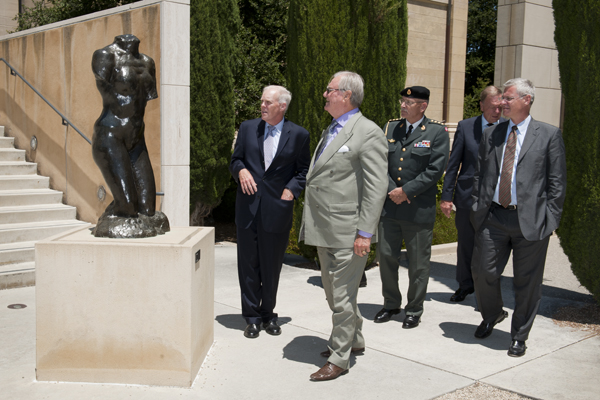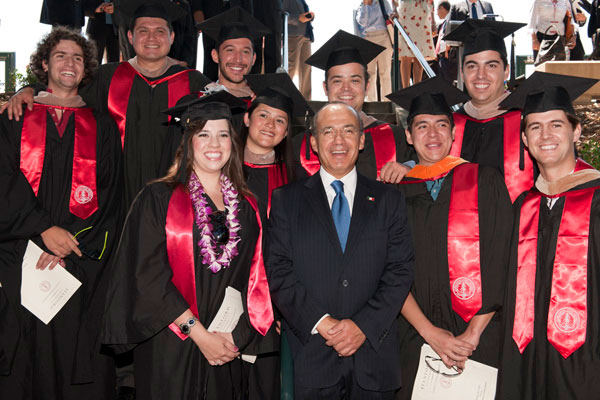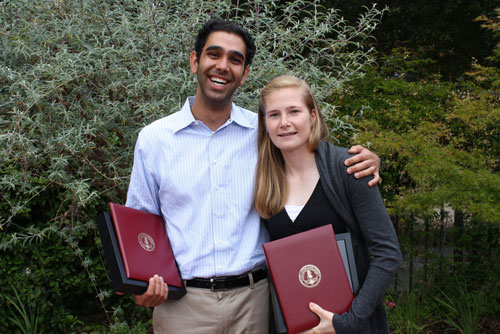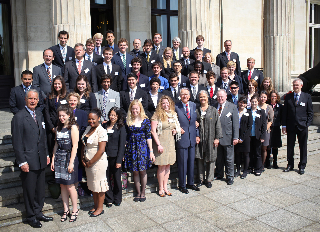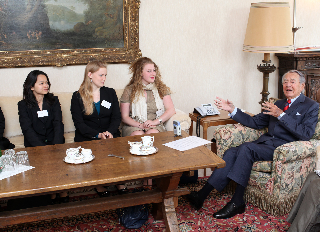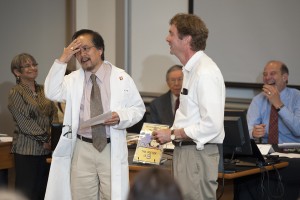
David Palumbo-Liu "diagnoses" the ills of a patient played by Brad Osgood.
At the final meeting of the 43rd Faculty Senate, the proceedings were abruptly interrupted by a “psychiatric emergency.” Dressed in a lab coat, Professor DAVID PALUMBO-LIU, whose primary discipline is comparative literature, began dispensing advice and pills to “patients” who came before him.
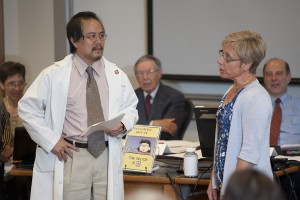
Martha Cyert, aka "Shirley Ballistic," explains her symptoms to Palumbo-Liu.
First was MARK ZOBACK: “I’m having terrible nightmares,” the geophysics professor complained. “Year after year, it’s meetings and meetings — faculty meetings, senate meetings, meetings about meetings. There’s even a committee about committees in my dreams. Can you help me?”
Palumbo-Liu’s diagnosis was “repetition compulsion,” which he said was a common malady among university professors and deliberative bodies. “Are you sure you’re asleep when this happens?” Palumbo-Liu asked. “Take two pills, get used to it, and don’t forget your co-pay on the way out.”
Next was BRAD OSGOOD, who confessed that the medication the good doctor had prescribed previously had not cured his malady: “It’s accreditation,” said Osgood, senior associate dean for student affairs in the School of Engineering and a professor of electrical engineering. “I can’t eat. I can’t sleep. I wake up at night thinking about measuring student learning outcomes.”
“The problem is that it actually means nothing,” Palumbo-Liu said. “This time, take two pills and wait two more years.”
Then came student “Shirley Ballistic,” played by MARTHA CYERT, senior associate vice provost for undergraduate education and a professor of
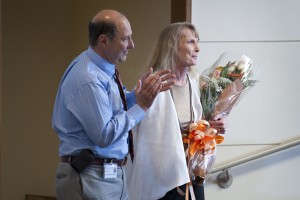
Outgoing Faculty Senate Chair David Spiegel leads the senate in a round of applause for Trish Del Pozzo of the Academic Secretary's Office.
biology. “I feel like I should be getting more out of life,” she said, adding that despite taking all upper and lower division courses in astrophysics, aeronautics and biology, she still wasn’t feeling fulfilled. Palumbo-Liu suggested that Ballistic was suffering from SUES syndrome, playing on the ongoing Study of Undergraduate Education at Stanford. The affliction, Palumbo-Liu said, “might take years to resolve.” In addition to the requisite pills, he recommended a course on French cinema.
The doctor’s last patient was a remote voice that complained of feeling out of touch. “I first noticed it when President Hennessy started talking about an New York City campus,” the voice said. “That’s distance-teaching syndrome. It may become an epidemic,” Palumbo-Liu said.
The skit was offered in honor of outgoing Faculty Senate Chair DAVID SPIEGEL, a professor of psychiatry and behavioral sciences.
“Thank you for a year of wonderful leadership in the senate,” Palumbo-Liu told Spiegel.
For his part, Spiegel thanked the senate, its staff, committees and ad hoc committees, noting that it had been a privilege, pleasure and an honor to serve as chair.
“Now that you have had a year of group therapy, I hope you’re all feeling a whole lot better,” Spiegel added.
—Elaine Ray
—Photos by L. A. Cicero
